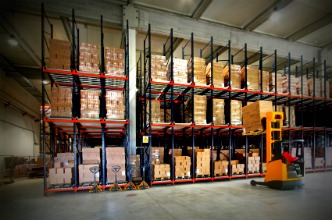I talk with buyers every day who are debating how to choose the right olive oil supplier — and their job depends on it. Of course, Extra Virgin Olive Oil is not the only product that they are debating, but but the analysis process looks pretty similar no matter what oils you’re responsible for sourcing — the biggest difference being that olive oil usually involves importing which can affect a few different parts of your decision making process
In the olive oil vendor search process, you have to uncover a lot of information and answer a lot of questions for yourself. In this article, we’ll address each of the questions below and explain how each suppliers’ answer could affect your final choice.

How Close Are They To You?
The physical location of your Extra Virgin Olive Oil supplier will be important. It’s not the end all be all, but it will affect a few important things.
Also, because olive oil is most often an imported item, you will find most suppliers on the coasts — east and west — and not as often in the central US.

Location Affects Shipping Costs
Your suppliers location will affect your shipping costs. If you have to ship across the entire country, this will definitely add up. That said, it’s most important to look at the total delivered cost, because sometimes the total cost may surprise you.
Because there’s such a few number of large oil suppliers in the US, chances are that you may not find one in your back yard. But you will find a distributor (who’s probably bought from a supplier, and then added their own mark up). So if you buy locally, you may save on shipping, but the oil cost could be higher.
Long story short, analyze your total delivered cost, because it’s the key component to compare!
Location Affects Lead Times
Your suppliers location will affect your lead times, because of the time it takes to ship from them to you.
Let’s pretend you’re comparing two different supply options: one is in the same state, and one is across the country. Even if they both process and ship out the oil within the same time period — let’s say one week — each order will still arrive at very different times. The one in the same state will take 1 week and 1 day to arrive. The one across the country will take at least 2 weeks to arrive. Will that longer timeframe work for you?
How Responsive Are They?
Like any company, it’s always important to work with someone who’s helpful and available. The oil supplier that you choose should have a rep that’s available when you need them (or very soon after) to talk about what you’re looking for. It’s also nice to have someone who can weigh in with industry experience on what’s going to work best and what’s not (and most importantly, WHY). Someone who’s opinion you trust, and who gives you the space to make your own decisions.
On top of that, the oil supplier you choose should have a support team that’s on top of things. One that can ship out orders within a reasonable timeframe, that only rarely makes mistakes (because let’s be real, it’s going to happen at some point — we’re all human).
Are They Committed To Product Quality?
Your supplier should be as committed to product quality as your company is, or more. With issues around adulteration and olive oil quality rampant, this is especially important when it comes to Extra Virgin Olive Oil.
Your suppliers should also have their own quality programs in place, which should be audited routinely. Common options include:
- HACCP Plans
- Good Manufacturing Practices (GMPs)
- 3rd Party Audits
- Organic Audits
- Non-GMO Project Verified Audits
- Kosher Certifications & Audits
Can You Get The QA Documents You Need?
 I firmly believe that every vendor should be able to give you basic documents and then some at a moments notice, and that you should automatically get Certificates of Analysis and other paperwork documentation with every order. EVERY ORDER.
I firmly believe that every vendor should be able to give you basic documents and then some at a moments notice, and that you should automatically get Certificates of Analysis and other paperwork documentation with every order. EVERY ORDER.
If you ever need it, your supplier should be able to give you some basic documents to get you started on the process of evaluating your oils. These documents include:
- Spec Sheet
- Allergen Sheet
- Nutritional Information
- SDS (used to be called MSDS)
- 3rd Party Audit
- Kosher Certificate
- Non-GMO Certificate
- Organic NOP Certificate
- Liability Insurance Copy
What Are Their Average Lead Times?
Lead times will play a big factor as you are choosing oil suppliers. Most suppliers will have an average timeline that they like to work within, but can try to fit you in depending on their schedule sooner if you need the oil urgently.
Lead times may or may not play a big factor depending on how far in advance you are able to plan your production. Those that don’t know what they’re going to need far in advance may find it easier to work with a supplier within a few states radius who is able to fit in last minute orders more easily.
If you’re buying imported EVOO, make sure that there is stock available here in the US. Importing lead times range from 8-10 weeks.
Having an open conversation with your account rep about your needs is probably the best way to go about this — that way you can set up a program or agreement that will work for both of you.
Specialized Or Broad Product Listing?
Does the supplier that you work with carry lots of different oils, or are they really good at only olive oil?
There isn’t a right answer on this one — it really depends on how much you use of each type of oil.
If you are a dressing company using a few totes of multiple oils, chances are that you’ll want to work directly with a supplier who carries all of them and get them from one place. This supplier will save you time and money on freight. And a lot of hassle.
If you’re using a LOT of one particular type of oil (multiple truckloads a month, for example), chances are that you’ll want to go directly to the source for this, or to the mill for this specific type of oil.
If you start R&D on a new project, the supplier with a broad listing will likely be able to help you with any new oil ingredients you might need. The specialized supplier will be great at what you do right now, but if you ever want to try a new product formulation, you’ll have to start your supply search from scratch.
Does Your Supplier Own A Facility Or Are They A Broker?
 Brokers are people that buy and sell oil but don’t take physical possession of it. They are re-sellers, and don’t have a facility that your oil is being packed in.
Brokers are people that buy and sell oil but don’t take physical possession of it. They are re-sellers, and don’t have a facility that your oil is being packed in.
Some brokers are great — if they know the olive oil industry inside and out, they can be a great resource. This is unusual to find in the US however.
Most often, if you’re buying smaller volumes from a broker, they are working with a national manufacturer to produce product and do what we call a “blind ship” or a “drop ship”: shipping directly from a supplier who owns inventory and a warehouse, directly to you, without ever touching it.
What’s wrong with this? Nothing, when they add value. But just remember that you are paying for their buying and selling services. So it’s a good question to ask — do you bring the oil into a facility, package it, and store it in the US for me? Or are you just re-selling it?
Do They Hold EVOO Inventory Domestically?
In the olive oil world, it’s reasonably common for suppliers to arrange shipment from the Mediterranean to your door. This requires a 8-10 week lead time for importing, so it may or may not fit for your buying system.
A good question to ask along with if they have a facility is how much inventory do they store domestically and how often is it turning? This will give you an idea of their size and scope, and how quickly you can get fill-in Extra Virgin Olive Oil.

Are They Priced Competitively?
This is one of the most obvious topics that people are often over-focused on, so I put this towards the end of the list. Price isn’t everything — any anyone who’s struggled with a cheap supplier (“cheap” in more ways than one) will attest to that. After a few orders with terrible service, they’re bound to go elsewhere.
But that said, it is important to have a supplier who is “within market”. Meaning that if you get a quote from multiple suppliers, the one you go with is in the same general range as a few of the others. In the oil world, this means that their business model is set up in the same way and that they have the same buying power.
You’ll find these suppliers that are within the same price range will all vary back and forth over time — sometimes one will be higher than the other on one oil, and the next year it will flip. This allows you to remove price from the immediate evaluation and look at the bigger picture knowing that pricing should equal out to about the same in the long run no matter who you choose.
Topics: Suppliers












